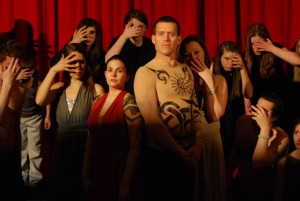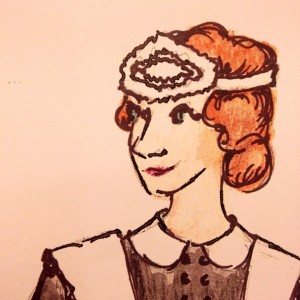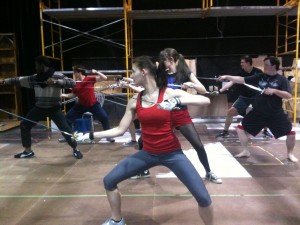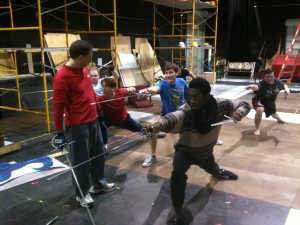Stage combat has more in common with a combination of ballroom dance and stage magic than it does with any actual fighting discipline. Once an illusion is decided upon, it becomes a matter of figuring out how to best execute it within the skill level of the cast and in the time allotted. This can be as “simple” as someone being slapped and/or falling down, or as complex as a duel to the death with chainsaws. The illusion must also further the story being told and support character development. If the fight director has done their job well it should be nearly impossible to determine where the director’s work ended and where the fight director’s has begun. Melissa Hillman has written an excellent article on the hiring, care, and feeding of fight directors.
All that said, I’d like to take this opportunity to discuss why the study of stage combat is important and why acquiring some familiarity with the skills involved in portraying violence in performance should be given some priority across the various disciplines.
Safety
Safety is the biggest reason to learn stage combat. For a profession with such a badass reputation, the practitioners spend a whole lot of time and energy being concerned with the well-being of everyone involved.
Fight directors are first and foremost concerned with keeping everyone safe. This is no small job. I’ve often seen otherwise brilliant people lose their damn minds when it comes to their own safety on stage. I feel like there is an article in the news about once a year about someone getting shot onstage with a real firearm. Think for a moment about how many things need to go wrong for that to happen. I’ve often told students that “the stage is like The Matrix, if you get hurt there, you get hurt in real life too.”
Performers need to be able to identify and actively avoid situations that might lead to injury. A working knowledge of the fundamentals of stage combat is a great start. An understanding of these principles can also help them advocate for themselves in instances where they might be being asked to do something unsafe. I’ve come to believe that it borders on unethical for a performance training program to send graduates out without these basic tools.
In the past I’ve also had stage managers take my classes and workshops alongside actors. If you are not “showfolk” and don’t know what a stage manager is, they are the backbone of a production. They make sure not only that everything happens, but that it happens on time, and happens correctly. I once invited an Actor’s Equity stage manager to speak to a theater appreciation class I was teaching and explain what they do. Near the end of the talk one of the students said, “so we clap for the actors, should we bow down to you?” A good stage manager has among their primary concerns that no one gets hurt on their watch.
I’ve heard it said by some of the people who’ve trained me that it’s often the simplest techniques that have the highest risk of injury. If you are dueling to the death with chainsaws, you respect the chainsaw and go through all the necessary safety procedures. But if the scene needs someone to be slapped and/or fall down, performers will sometimes think that “they can take it.” “Taking it” might land a performer in a hospital.
Narrative Clarity
Few disciplines within theater enjoy the clarity of dramatic conflict and narrative transparency that fight directors have as a matter of course.
Any specific technique should be able to communicate a storyline (or a piece of one). If one character is striking another and they fall down, the audience should be able to follow the action of what is happening from beginning to end. That is to say, from several seconds before the blow lands until after the victim hits the floor. In a longer sequence, such as a duel for instance, each moment is a piece of narrative action. One character feinting a cut to the head, disengaging their blade after drawing a parry, and then executing a blow that is barely dodged might take less time to perform onstage than it did to read, but involves an entire series of narrative actions with the conflict being clear throughout. If there is a reversal (in the Aristotelian sense), that aspect of the storyline is generally extremely clear.
Actor training is often about having clear objectives and understanding dramatic conflict. Characters in violent conflict are among the most direct manifestations of clear objectives and conflict.
This narrative clarity is extraordinarily useful for directors, designers, playwrights, and dramaturgs. When Romeo is trying to kill Tybalt, there is little ambiguity about what the characters want, but there is no limit to how those wants might be played out.
Understanding of Illusion
While according to some scholars, we live in one of the least violent periods of history, Lt. Colonel David Grossman observed in his book, On Killing: The Psychological Cost of Learning to Kill in War and Society, that the majority of those who purport to study violence do so “in a world of virgins studying sex.” The overwhelming majority of any violence that anyone reading this is likely to see probably happens in the context of its portrayal in an entertainment medium, either in a context where it was composed by someone like myself, or in the context of athletic competition. Since we see so little actual violence (a good thing, I would say), a basic understanding of how the popular illusions of violence are created is useful. I would argue that an understanding of the illusions would lead us to enjoy them more, the same way that an understanding of music leads to a greater appreciation of the same.
Also, there is much to be said for having a better grasp of how specific genres of illusions are created when engaging in creating a larger illusion yourself. This is true for nonactors as well. The understanding of illusion also relates to an appreciation for narrative clarity. If one understands intellectually that a stage punch is not a real punch, that the scene in which a duel took place was a cooperative venture, and that it was composed with safety, narrative, and sightlines in mind, then the overall appreciation of the larger production can only increase.
Collaborative Synergy
At their best, composition of fight scenes involves a unified effort between the fight director, the director, the performers, designers, and technicians.
I had a great experience that was illustrative of this synergy while choreographing a scene for Aunt Dan and Lemon with Whistler in the Dark last season. The illusion for a pivotal scene involved interfacing the costume design with the set design in order for movement to be created that told the story in the script. There is a scene in the play in which a man is drugged and tied to a bed in a spread-eagled position, and then strangled with a pair of stockings by a woman who stands over him. As the man’s hands are unavailable to engage in the basic safeguards of a stage choke if the stage directions are followed, another solution must be found.
In this case, there was a piece of cloth of identical color and texture secured to the headboard of the bed. As the stockings used to choke the character are being placed on the actor’s throat, the actress reaches underneath and grabs the cloth attached to the bed, bringing it up on either side of the actor’s head, with no pressure whatsoever being brought to bear on the actor playing the man’s throat. As the character is choked, the actor played out the stages of asphyxiation from a place of complete physical safety.
On a very practical level, whatever your discipline within theater or film, understanding the basics of your collaborator’s discipline will speed up communication and deepen the process (I’m speaking broadly here as this is true of all the disciplines in theater). Specifically in regard to combat and performers, if you’re an actor, you’ll be able to learn more complex choreography more quickly, expanding the options available for the final product.
Broadening of Dramaturgical and Textual Analysis
“They Fight” is a great stage direction. And in many classics involves a lot of context. By broadening the understanding of violence on stage, we can understand how and why it might happen in dramatic literature.
Characters are always in pursuit of their wants. In Stanislavskian terms, actors pursue character objectives. To paraphrase military theorist Carl von Clausewitz, stage combat is the pursuit of objective by other means. By way of example, in Satre’s No Exit, Estelle wants Inez out of the room. At one point, she begins to physically remove her from the space, and would succeed if Garcin did not convince her to change her course of action. A similar scene takes place in Burn This by Lanford Wilson when Burton wants Pale out of Anna’s apartment, and that scene then escalates dramatically. Niether of these plays are known for their fight scenes to the degree of say, Romeo and Juliet or Killer Joe, but in all of these examples characters apply physical force in pursuit of their objectives.
Stage combat is an aspect of modern theater that really doesn’t get the attention it deserves. We can start to give it that attention by learning the basics of how it’s done, and then taking that knowledge to other areas.
Note: This article was modified from a blog post on MeronLangsner.com
– See more at: http://howlround.com/why-everyone-should-study-stage-combat#sthash.CVejAfOx.dpuf





